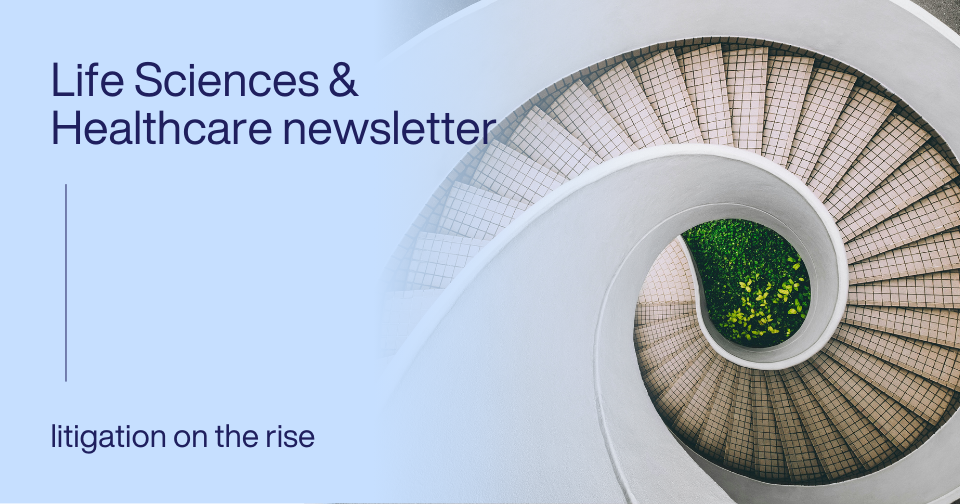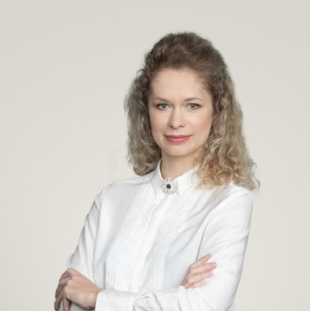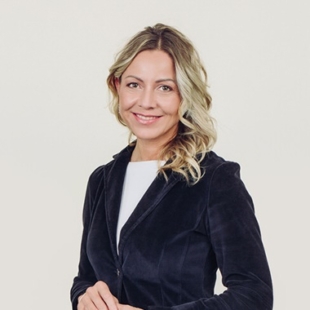The number of litigations and disputes is increasing in the life sciences sector worldwide, including across Europe and our region. This trend is driven by regulatory reforms, patent complexities, and the establishment of the Unified Patent Court (UPC). This newsletter highlights the key litigation trends that the businesses should be aware of and that have also occupied our workdays.

Patents in the life sciences industry
Recently, we have seen a surge in patent litigations in Europe as well as in our region. This is understandable as we are in the middle of a patent cliff era during which many blockbuster drugs are losing their exclusivity.
In Estonia, Latvia and Lithuania the number of patent litigations has steadily risen since 2020. Our team has represented pharmaceutical companies both in out-of-court negotiations and court proceedings.
The patent litigation landscape has gotten even more interesting with the Unified Patent Court (UPC). So far, with the “classic” European patents, the patent holders had to individually validate the patent in those countries after the European patent was granted. This, of course, resulted in fragmented results in different European countries. However, with the UPC, it is possible to litigate in only one court and get a result that extends not only to all UPC member states but sometimes even to non-UPC states. So the stakes are very high.
The UPC statistics indicate that the number of patent disputes in the life sciences industry is high, which suggests that stakeholders are increasingly turning to UPC proceedings. Although the UPC has been hearing cases for just two years, it is already shaping the industry. The UPC has confirmed patentability of biotech strains in Amycel, limited Bolar exemption in Novartis & Genetech v Celltrion, and clarified the test and evidence for establishing infringement of second medical use claims in Sanofi v Amgen, among other things. Our Intellectual Property team has also had opportunities to contribute to the UPC proceedings in Nordic Baltic Regional Division.
Product liability in the life science industry
The combined effect of the New Product Liability Directive and the Representative Actions Directive will also likely increase litigation in the EU’s life sciences industry. These directives establish a more claimant-friendly regime in the EU that, on one hand, decreases the legal certainty for business and on the other hand exposes the life sciences industry to increased financial liability, reputational harm, and heightened regulatory scrutiny, including the risk of potential sanctions.
The Product Liability Directive, on a general level, retains the principles that were already established in the old directive. It ensures that victims can claim compensation if they suffer damage caused by a defective product. But, and there is a huge but, now the burden of proof may lie more on the economic operators than on the customer, and this means a considerable change in the legal structure of such disputes. For example, pursuant to Article 10(2) of the said directive, the product is presumed to be defective when the defendant fails to disclose the requested pertinent evidence. Thereby, the defendant needs to prove that the product was defect-free, not the claimant, to prove that there was a defect.
At the same time, the Representative Actions Directive empowers consumers to take collective action against entities that have harmed or may harm their collective interests. Through collective actions, consumers can, for example, seek to halt infringing conduct or claim compensation for damages.
Whereas collective action has a long and well-established history in the United States, the EU Member States are slowly starting to use this mechanism. According to a study commissioned by the European Justice Forum, collective action cases have surged across the EU, with countries like the Netherlands, Portugal, Germany, and Slovenia reporting a higher volume of mass litigation.
- In Estonia, the relevant changes to the Code of Civil Procedure entered into force on January 1 2025.
- In Latvia collective actions can be submitted since 15 October 2023, however, to the best of our knowledge, this possibility has not been used yet in the field of life sciences.
- In Lithuania, collective actions can be submitted from 1 January 2015. However, they remain uncommon, and the practice in this area is still developing.
The combined regime of the Product Liability Directive and the Representative Actions Directive will probably lead to more mass tort-style litigation in the life sciences and cross-border actions. We also already see that third-party litigation funders are increasingly backing these cases. If any assistance is needed, please contact our Dispute Resolution & Risk Management team.
Major arbitral institutions report a surge in life sciences arbitration
According to data from major arbitral institutions, arbitration in the life sciences sector is also on the rise:
- London Court of International Arbitration reports that 5 per cent of its case load involves life sciences;
- WIPO Alternative Dispute Resolution reports that approximately 15 per cent of its case load involves life sciences;
- American Arbitration Association-International Centre for Dispute Resolution reports that its case load in life sciences has doubled since 2019;
- SCC Arbitration Institute reports an overall surge in arbitration filings.
More and more, we are advising our clients to choose arbitration over the classical court system. Especially in the cross-border commercial deals (e.g. licensing agreements, collaboration and joint venture agreements, manufacturing and supply agreements, distribution and marketing agreements, technology transfer agreements, and R&D agreements). Arbitration offers several advantages for the sensitive life sciences sector, including:
– Confidentiality – highly sensitive commercial information shall remain confidential to the highest degree;
– Speed and control – the parties can control the procedure, choose expert arbitrators, and consolidate multi-jurisdictional disputes into one arbitration;
– Finality – arbitral awards are challengeable in exceptional circumstances, which offers certainty and finality for the parties;
– Enforcement – arbitral awards are generally easier to enforce internationally than classical court judgments.
Our International Arbitration team and our Life Sciences & Healthcare team combine industry insight with legal expertise and capacity to represent clients in top arbitration institutions with high-value and sensitive cases.
#sorainenlifesciences: our practice in action
- With the goal of strengthening the region’s competitiveness in the life sciences field, Sorainen is contributing to the Life Sciences Baltics 2025 event as B2B Lounge sponsors and participants. The conference in Vilnius will be attended by partners Lise-Lotte Lääne (head of Life Sciences & Healthcare sector group), Dr. Daivis Švirinas, Miglė Petkevičienė and Kazimieras Karpickis, as well as Senior Associates Marika Grunte (head of Latvian Life Sciences & Healthcare sector group), Dovydas Gudžiūnas (head of Lithuanian Life Sciences & Healthcare sector group) and Marijus Dingilevskis. At the Life Sciences Baltics 2025, Dovydas Gudžiūnas will be delivering a presentation “Regulatory Data Protection is at Risk – So Might Pharma Investments”, followed by a panel discussion.
- Marika Grunte participated in “The Helsinki Health Law Days” – an academic conference organized by the University of Helsinki that brought together experts in health law, regulation, bioethics, digital health, and life sciences. The conference featured keynote speeches and presentations on emerging legal and ethical issues in health innovation and regulation, with sessions covering topics such as digital patient data, AI-assisted medical treatments, regulatory exclusivity, access to medicines, and cross-border health data sharing.
- Lise-Lotte Lääne moderated a panel about Smart Hospitals and related IP issues at the AIJA Annual Conference in Washington, D.C. The panel with esteemed speakers from the UK, the USA and Serbia discussed how to find correct licensing models for complex technologies, and how to ensure at the same time that the patients’ rights are also well-protected.
- Partner Mihkel Miidla attended Estonian Health Tech Week and gave his insights to the panel “AI as a Collegial Advisor: The Physician’s Role in the Digital Decision Room.” It seems that AI pushes us to reconsider the “classical” principles of healthcare provision rather sooner than later.
Our international Life Sciences & Healthcare team is at your disposal, should you need advice on any legal issues you are facing.
Subscribe here if you would like to receive newsletters and invitations to webinars and offline events.
Contact our experts:

Regional head of Life Sciences & Healthcare sector group, Estonia

Senior Associate, head of Life Sciences & Healthcare sector group in Latvia

Senior Associate, head of Life Sciences & Healthcare sector group in Lithuania


